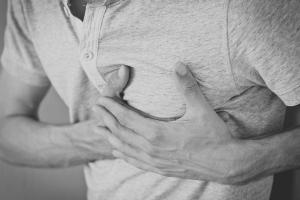If you have heart disease, your heart is less efficient at pumping blood. The blood vessels throughout your body, which facilitate blood flow to various organs, may be damaged as well.

These conditions can have significant harmful effects on your heart as well as your other organs. The harder your heart has to work to maintain your body’s circulation, the more likely it is that you will experience a major complication from heart disease.
Heart Disease’s Major Complications
Heart disease can cause health issues that affect your heart, such as heart attacks and congestive heart failure. It can also cause renal failure.
Heart Attack

Heart disease can limit not only the blood flow throughout your body but also the supply of blood to your heart. The proper supply of oxygenated blood can be restricted due to plaque buildup in your coronary arteries, in a condition known as coronary artery disease. This is the primary cause of heart attacks.
During a heart attack, the cells in your heart don’t receive enough oxygen, and without oxygen, the cells start to die.
Common symptoms of a heart attack include chest pain, shortness of breath, and pain in other areas of your upper body like your arms, jaw, and neck. These symptoms can vary between men and women, with women being more likely to experience jaw or back pain and shortness of breath in addition to or sometimes instead of chest pain.
If you experience chest pain or otherwise believe you might be having a heart attack, seek medical treatment immediately. It is better to be overly cautious than to ignore the symptoms when you are really having a heart attack.
Congestive Heart Failure
Congestive heart failure is also caused by the narrowing of the arteries that supply blood to your heart due to plaque buildup. It is named after the ‘congestion’ that occurs in body tissue when blood is unable to circulate properly. This often causes swelling in the legs and ankles.
Heart failure can also be systolic or diastolic. Diastolic heart failure means your heart isn’t properly relaxing between beats, while systolic means it isn’t properly contracting.
Renal Failure
Chronic kidney disease affects about 14 percent of the population, with one of its most common causes being high blood pressure. Long-term high blood pressure, or hypertension, damages the arteries that supply blood to your kidneys, leaving them unable to filter waste in your blood properly. Damage to your blood vessels from heart disease can make this worse and speed up the progression of kidney disease to renal failure.
In the state of renal failure, your kidneys are no longer able to filter blood on their own. Renal failure is irreversible, and if left untreated, can be life-threatening. If you cannot get a kidney transplant, you will have to go on dialysis for the remainder of your life.
Avoiding These Complications
The most effective way to reduce your risk of having a heart attack, congestive heart failure, and renal failure is to target the factors that put you most at risk of developing heart disease in the first place.
Heart Disease Treatment

Many heart disease treatment methods involve lifestyle changes, which can be used to improve your health, whether you already have the warning signs of heart disease or not. Improve the strength of your heart by practicing routine exercise and avoiding eating too much fat, sugar, and sodium. Making these small changes can have a significant impact on your health.
If you already have heart disease, speak to your doctor about your concerns about developing heart complications. They will advise you on potential lifestyle changes, or they may recommend medication treatment.
Since heart disease can interfere with blood flow to the kidneys, take steps to improve the health of your kidneys too.
Kidney-friendly diets are low in protein, and they avoid minerals that are harder for your kidneys to process, such as phosphorus and potassium. Nutrition plans like the renal diet emphasize whole grains, fruits, and vegetables as part of a balanced meal.
It’s just as important to avoid excess sodium and fat in your diet for your kidneys’ sake as it is for your heart’s sake, and exercise can help here as well. Heart-healthy and kidney-friendly lifestyles are compatible with each other, and it’s a good idea to follow both if you want to prevent heart and kidney disease.
Final Thoughts
The complications of heart disease can be life-threatening, and you must make every effort to try to prevent their occurrence. Always take heart disease seriously and do your part in managing the condition before it results in a heart attack, congestive heart failure, or renal failure.
